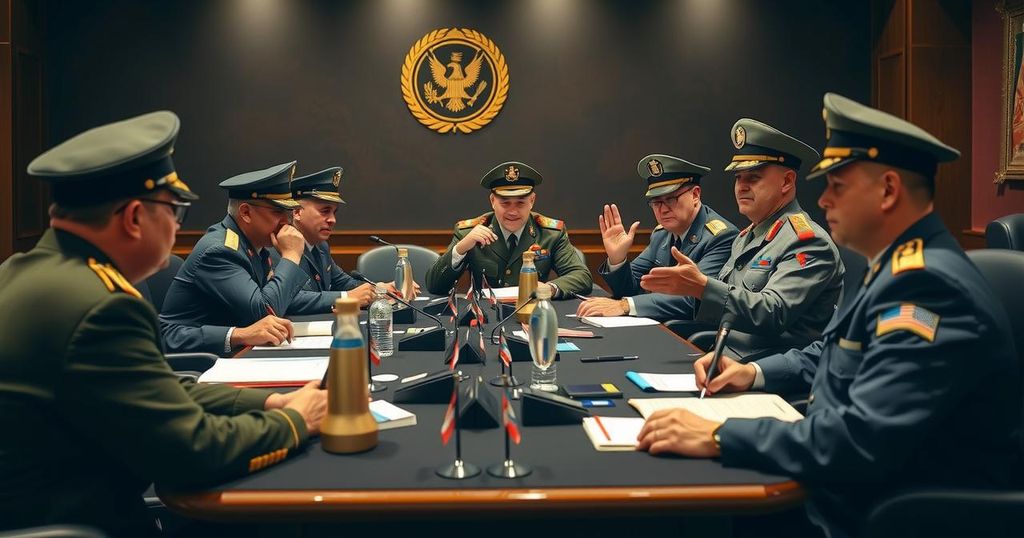Admiral Bauer’s Visit Highlights NATO-Mongolia Partnership Enhancement

Admiral Bauer, Chair of the NATO Military Committee, visited Mongolia from September 8-10, 2024, at the invitation of the Chief of Staff. The visit emphasized NATO’s commitment to partnership and cooperation, particularly in capacity building and interoperability. Key discussions included military modernization, peacekeeping contributions, and strategic emphasis on integrated diplomacy, culminating in a tribute to Mongolia’s historical military legacy.
From September 8 to 10, 2024, Admiral Bauer, Chair of the NATO Military Committee, made an official visit to Mongolia at the invitation of the Chief of the General Staff of the Mongolian Armed Forces. This visit highlighted the importance of NATO’s enduring partnership with Mongolia and allowed for discussions on enhancing dialogue and cooperation. Admiral Bauer underscored NATO’s commitment to strengthening capability building and interoperability, whilst sharing key outcomes from the 2024 Washington DC Summit.
During his visit, Admiral Bauer toured the Five Hills Peace Support Operations Training Center, where he observed the Mongolian Armed Forces’ dedication to global stability and their valuable contributions through NATO international missions over the last sixteen years, including operations in Kosovo and Afghanistan. On September 9, Admiral Bauer was honored with a military guard upon visiting the General Staff, where he held discussions with Chief of the General Staff Major General Ganbyamba Sunrev concerning the modernization efforts of the Mongolian Armed Forces.
Subsequently, he met with Mongolian troops who participated in NATO-led missions and held discussions with various officials, including Brigadier General Gankhuyag.D at the Ministry of Defence and Secretary of the National Security Council, Mr. Byambajargal. During these meetings, Admiral Bauer emphasized the significance of military cooperation in addressing global security challenges, asserting that collaboration with NATO partners is anchored in mutual respect and tailored to their needs.
On September 10, Admiral Bauer engaged with representatives from Allied embassies, presenting the importance of integrating civilian and military diplomacy. The visit culminated with a tribute at the statue of Chinggis Khaan, reflecting on Mongolia’s historical and military legacy. It is noteworthy that NATO and Mongolia have engaged in cooperative dialogue since 2005, transitioning to a tailored partnership program in 2024, which encompasses various collaborative initiatives, including the Women, Peace and Security agenda and cyber defense.
The NATO-Mongolia partnership has been significant since its inception in 2005, facilitating various levels of dialogue and cooperation. The collaboration has grown steadily, with Mongolia transitioning from an Individual Partnership and Cooperation Programme to its first Individually Tailored Partnership Programme in 2024. This ongoing relationship encompasses a broad spectrum of issues such as security, capacity building, and support for peacekeeping initiatives, while promoting shared democratic values and stability in the region. Mongolia’s commitment to international security has been exemplified by its contributions to peacekeeping missions under NATO’s framework. The Five Hills Peace Support Operations Training Centre has been crucial in providing training and education related to peace operations. Such partnerships bolster not only Mongolia’s military capabilities but also strengthen NATO’s strategic outreach in the Asian region.
Admiral Bauer’s visit to Mongolia signifies NATO’s persistent commitment to fostering strong partnerships that address global security challenges. The discussions surrounding modernization efforts of the Mongolian Armed Forces and cooperation in invaluable peacekeeping experiences illustrate the depth of NATO-Mongolia relations. As both entities continue to work together, their collaborative endeavors will enhance regional stability and promote shared democratic values, paving the way for future engagements and cooperative advancements.
Original Source: www.nato.int








